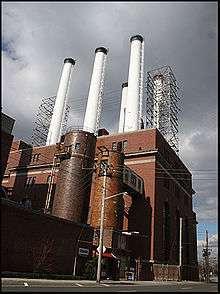Long Island Lighting Company
The Long Island Lighting Company, or LILCO [ "lil-co" ], was an electrical power company and natural gas utility for the communities of Long Island, New York, serving 2.7 million people in Nassau, Suffolk and Queens Counties.[1]
.jpg) LILCO Logo of the 60s and 90s | |
| Industry | Electric Utility |
|---|---|
| Fate | Electrical transmission network acquired by LIPA, electrical distribution system and natural gas operations merged with Brooklyn Union Gas to form KeySpan |
| Successor | Long Island Power Authority, KeySpan |
| Founded | Long Island, New York (1911) by Ellis Laurimore Phillips & George W. Olmsted |
| Defunct | 1998 |
| Headquarters | Hicksville, New York, United States of America[1] |
Key people | W. J. Catacosinos, Chairman & CEO, J. T. Flynn, President & COO, A. Nozzolillo, Sr. VP-Finance & CFO, T. A. Babcock, Treasurer, K. A. Marion, Corporate Secretary |
| Products | Electrical & natural gas utility[1] in Nassau, Suffolk and Queens Counties, on Long Island, New York[1] |

LILCO was the original power utility for Long Island from 1911 until 1998. It was founded by Ellis Laurimore Phillips, an engineer, and a group of New York City investors, including George W. Olmsted,[2] when they purchased four small electric companies in Amityville, Islip, Northport and Sayville.[3]
LILCO was long notorious for its high rates. Indeed, according to a 1999 article in The New York Times, LILCO's rates were considered part of an "unholy trinity of life on Long Island," along with the Long Island Rail Road's service woes and traffic snarls on the Long Island Expressway.[4]
Hurricane Gloria hit Long Island on September 27, 1985, but power was not fully restored until October 8. The utility's poor response to the storm further eroded public confidence in LILCO's ability to handle an emergency and placed increased pressure to shutter the LILCO built Shoreham Nuclear Power Plant. Two years earlier, the Suffolk County legislature resolved that the county could not be safely evacuated in the event of an emergency.[5][6] In an effort to show they were prepared for the event of a nuclear mishap at Shoreham, LILCO created a volunteer organization, staffed by Shoreham engineers and various staff from LILCO itself, named LERO (Local Emergency Response Organization) to provide assistance to the public.[7] In the end, in a political decision born from LILCO's inability to present a viable evacuation plan for Suffolk County, Shoreham was closed down in 1992 after never having operated at more than minimum power for testing purposes. LILCO's assets were then bought by the Long Island Power Authority (LIPA), a public authority.[3]
On March 5, 1998, final Federal approval was received for LIPA to take over LILCO's electrical transmission network. The deal was completed later that year. The rest of LILCO, including its electrical distribution and natural gas businesses, merged with Brooklyn Union Gas to form KeySpan, which continued to run LILCO's old transmission network under contract with LIPA. KeySpan was taken over by National Grid USA in 2007. National Grid handed control of Long Island's electrical transmission system to New Jersey utility Public Service Enterprise Group in 2014.
References
- Company profile at Business.com
- "Long Island Lighting Co. Mortgage," New York Times (1857-Current file); 4 June 1911, pg. XX7; ProQuest Historical Newspapers The New York Times (1851 - 2003). Retrieved 30 March 2007.
- Long Island Our Story, New York Newsday
- Halbfinger, David M. (July 30, 1999). "The Long Island Rail Road: Busiest, but Far From Best". New York Times. Retrieved January 17, 2019.
- Fagin, Dan (2007-05-29). "Lights Out at Shoreham". Newsday. Archived from the original on 2007-12-01. Retrieved 2007-08-30.
- Dennis Hevesi (August 22, 2011). "Nora Bredes, Who Fought Long Island Nuclear Plant, Dies at 60". New York Times.
- https://www.nytimes.com/1983/12/18/nyregion/how-lilco-and-suffolk-view-plans-for-evacuation.html?pagewanted=all&mcubz=3